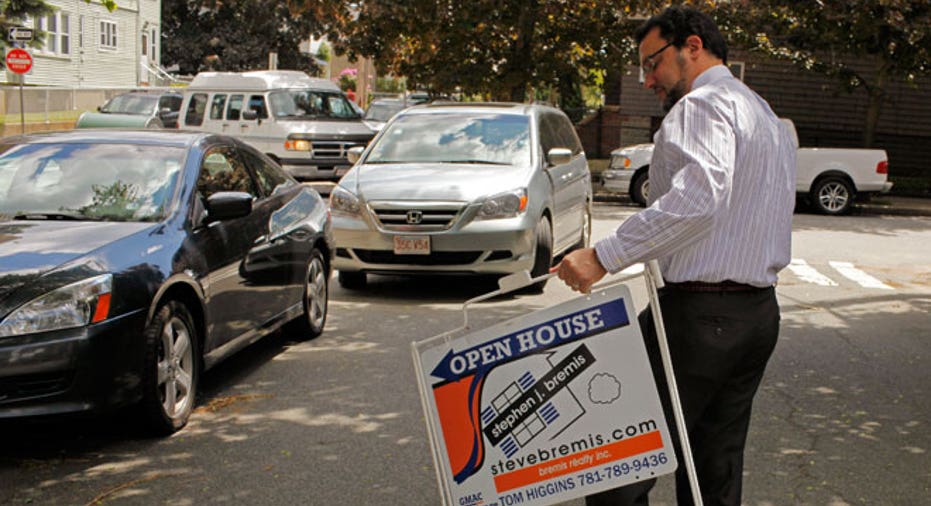Pushed at an Open House: My Trials and Tribulations as a First-Time Homebuyer

I knew buying my first home wouldn’t be easy. I was wrong. It’s been brutal.
My husband and I moved to Washington, D.C., from Manhattan in 2012 and after renting for a year (and growing tired of hearing everything our neighbors were up to), we launched our house hunt. Perhaps a bit too ambitiously, we started out looking for a three-bedroom, two-and-a-half-bathroom rowhouse in Capitol Hill. Now, five months and 60-plus open houses later, not only has our potential neighborhood radius expanded, but our requirements have dropped. Maybe we don’t need that half bathroom, or third bedroom, or a basement.
The housing market is seemingly recovering throughout most the country, but the D.C. area didn’t take the hit the other markets experienced when the bubble burst in 2008. The unemployment rate in our nation’s capital peaked at 6.5% during the downturn, and is currently 5.2%, well below the country’s average as jobs continue to be added to the area, according to Ken Fears, senior economist, at the National Association of Realtors. Because of this, the D.C. market is not just recuperating, it’s thriving.
This is terrific for the local economy and great for current homeowners, but not so terrific for young couples like us on the hunt for their first home.
Fears explained: “Inventory is pretty low and has been for awhile, so that creates a supply-and-demand issue. The area is also being very responsive to changes in interest rates because of the high prices, when the rates remain as low as they are now, you see bidding frenzies break out and strong competition for properties.”
You’re telling me. About a month into the process, a house hit on a Friday night and we thought it was our dream home. Giddily, we called our agent, Tom Faison, and he met us at the house at 9:00 a.m. the next morning. We weren’t the first ones there. And as I walked through the house, a man literally pushed me out of the way so he could get a better look at the tiny room being called an extra living space. Clearly he thought he had found his dream house as well, and I wasn’t part of the picture.
The house wasn’t for us, but it sold for $20,000 more than asking price.
There was also the time we walked up to an open house only to find it canceled because the home was already under contract -- despite only being on the market for two days. Recently we went to see a house at 8:00 in the morning after it hit the market, and it was under contract by that afternoon.
I now stalk MRIS listings, Zillow and Redfin for new homes, and we’ve had plenty of false alarms of places that look perfect only to learn how deceptive camera lenses and angles can be. The search has become almost a full-time job because if a decent property hits the market, expect it to be under contract within 48 hours. Decent -- not great, just decent.
It’s hard being forced to make arguably the biggest financial decision of your life in 48-hours.
There are weeks when I see and talk to my real estate agent more than my family. I know how he likes his coffee, what weekends he has his kids and that he will hang back outside the house when he knows it’s not for us, but is humoring us anyway. We’ve come up with our own special ranking system on how bad a house is based on the number of showers necessary to take after walking through it. I am pretty sure he will be on my invite list for my first Thanksgiving in my new home.
We’ve become expert house hunters; I can spot and tally air returns as I roam a house for the first time, estimate the age of an HVAC system and how to look past paint color and bad décor to evaluate the actual house and not the current owners.
We’ve been close to getting a home, making an offer that included an escalation clause, waived the financing, appraisal and inspection contingencies (after paying for a pre-inspection), and included an earnest money deposit. We lost to an all-cash offer. Hard to beat that.
Fears says this hyper-market activity was also present in 2003 and 2004 when buyers waived inspection and financing contingencies to have a shot at getting the deal. While bidding wars have become common in this market, he isn’t worried of a looming bubble.
“Those are dangers signs, but this time around the financing aspect is keeping things under wraps. In spring of 2005 when prices hit the ceiling of affordability, we saw all these exotic loans come up to lower monthly payments which fueled the frenzy. We don’t have that -- lending is still pretty strict and that will choke off and curb risky behavior.”
He expects home prices and market activity to start to settle soon as more homeowners become above water on their mortgages and ready to sell and upgrade.
“When people feel they have enough equity to sell and repurchase, that will help, but they need to feel confident they will be able to pick up a new home, so we will also need to see more construction come online and that will feed the inventory shortages and make people more comfortable.”
I can only hope.



















